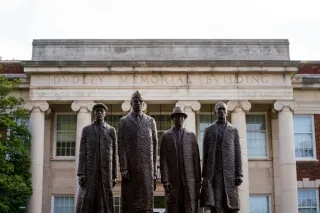
Hero - Interior Page Hero Module
Ways to explore
For travelers in pursuit of civil rights history and Black heritage, the NC Civil Rights Trail is your gateway to significant sites in North Carolina’s — and our country’s — story. As a complement to the US Civil Rights Trail, all stops on the NC Civil Rights Trail invite exploration and reflection.
Highlighting protests, community organizations, milestones, court cases and more, this project is being developed by the NC African American Heritage Commission and will feature up to 50 markers once completed. The guide below features selected destinations with official sites on the trail. For the full list of locations across NC, plus additional points of interest such as rallies, birthplaces, courthouses, churches and visits by civil rights icons, start exploring the trail virtually.
Additionally, delve into the details of these significant moments by listening to the North Carolina Civil Rights Trail podcast. You’ll also hear real stories of people who lived them — and why what the young protesters did in North Carolina is still so relevant today.
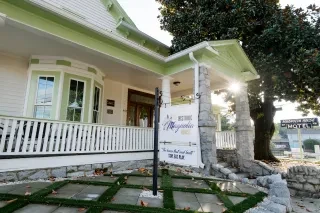
Greensboro
Occupying the former F.W. Woolworth department store where the 1960 lunch counter sit-in movement was launched by four NC A&T freshmen — plus several women from Bennett College who helped initiate and plan the movement — the International Civil Rights Center & Museum makes Greensboro a top-tier destination for civil rights travel. Other sites and histories enrich the experience:
- Stay the night in Historic Magnolia House — a former "Green Book" motel — like Jackie Robinson and Tina Turner did during the Jim Crow era.
- Check out the February One monument on NC A&T University’s campus honoring the four alumni who led the sit-in.
- Play a round at Gillespie Golf Course, where six Black players fought for the right to play.
- Support Black-owned businesses: Savor the fare at Stephanie’s, and pick up something sweet at Black Magnolia Southern Patisserie or Savor the Moment Bakery & Dessert Café. Enjoy drinks and live music at The Loft at Elm Street Lounge.

Fayetteville
Though Fayetteville is perhaps best known for Fort Bragg, the largest post in the US Military, a 2022 Lending Tree survey also found the city has the highest percentage of Black-owned businesses in the US. Plus, it was the first place named after Marquis de Lafayette, the Revolutionary War hero and author of "The Declaration of the Rights of Man and of the Citizen." Stops include:
- Downtown Fayetteville, where the trail commemorates 1963’s student-led protests that led to the end of segregation at businesses.
- Museum of the Cape Fear Historical Complex, which covers four centuries of history.
- The 82nd Airborne & Special Operations Museum, where heroic stories — like the first all-Black parachute infantry platoon — come to life.
- Find more military history two hours east in Jacksonville, where the Montford Point Marines, who were the first African Americans to enlist in the US Marine Corps, are honored with a memorial and museum.
- Support Black-owned businesses: Spend a day at Sweet Valley Ranch, a must-visit agritourism attraction. Head to Dirtbag Ales for food and brews. Treat yourself to Uptown’s Chicken & Waffles, or go for specialties at Heart and Soul Restaurant and Lounge.
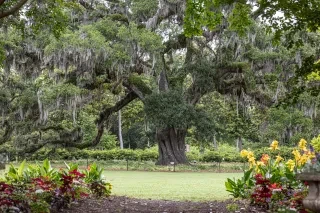
Wilmington
Black history fills the Port City:
- A new trail marker honoring Hubert Eaton Sr. — tennis great Althea Gibson’s mentor who led efforts to improve education and health care for Black residents — adds dimension to Wilmington’s history and more reason for quality time exploring.
- Guided or self-guided tours incorporate everything from the Wilmington Coup to highlighting sites such as Cameron Art Museum, where the nation’s first park dedicated to the US Colored Troops opened in 2022.
- Stop at Bellamy Mansion Museum and Poplar Grove Plantation, both on the Gullah Geechee Cultural Heritage Corridor, where the stories of their owners and enslaved residents are traced.
- The Cape Fear Museum's exhibits span from the Civil Rights era and the Wilmington Ten to Michael Jordan's greatness. (Please note: The museum is temporarily closed.) And if the outdoors are more up your alley, don’t miss Airlie Gardens, where self-taught artist Minnie Evans worked as gatekeeper.
- Support Black-owned businesses: Chef Keith Rhodes’ coastal Caribbean restaurant Voyce Bistro attracts everyone from local diners to Hollywood stars in town for projects. Enjoy more choice fare at Nippy’s Soul Food Restaurant, Sweet D’s Cuisine and On Thyme Restaurant. Or plan a pop-up meal with Luxe Picnic Co.
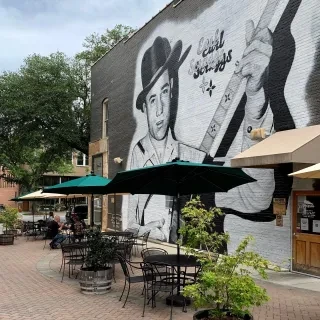
Shelby
Shelby’s 20th-century history includes chapters as a political powerhouse and a major textiles center. Our top picks for civil rights history include:
- The site commemorating the 1960 Shelby Sit-Ins at 104 E. Warren Street, where Buffalo Creek Gallery currently resides.
- Earl Scruggs Center, where the banjo master and Shelby native’s life story sits alongside the history and cultural traditions of the region.
- The Cleveland County African American Heritage Trail, a driving tour that covers 11 churches, schools and other sites.
- Sunset Cemetery’s monuments, funerary art and authors’ graves.
- Support Black-owned businesses: Stay near the heart of town at the stately Morgan & Wells Bed & Breakfast; fill up at Sweethouse Bakery and Phyllis’ Sweet Shop; and shop at Imperial Comics and Games.
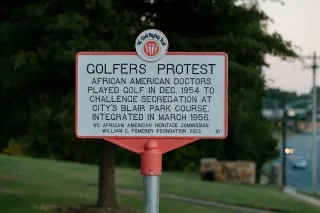
High Point
Known as the “Home Furnishings Capital of the World,” High Point boasts a vibrant culture, a flourishing culinary scene and intriguing pockets of civil rights history. Some inspiration:
- Hit the links at Blair Park Municipal Golf Course, a trail site where segregation was fought in 1954.
- Explore John Coltrane sites, including the bronze sculpture honoring the legendary musician, his childhood home and the museum that displays his old piano.
- Peruse the map provided by Visit High Point and stroll a once-flourishing Black business district in the Historic Washington Street neighborhood.
- Support Black-owned businesses: Feast at Unwind on Main Café and Bar, Uncle Cheesecake, and Mayberry Ice Cream & Sandwich Shop.
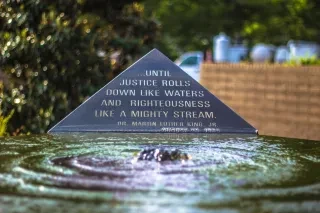
Raleigh
NC’s capital city has abundant history and places to explore it, starting with the NC Museum of History. Its “Story of North Carolina” anchor exhibit includes an exploration of the civil rights era. (Please note: The museum is currently closed for renovations.) Other key sites in Raleigh include:
- The Village District, where the February 1960 sit-ins are commemorated.
- Dr. Martin Luther King Jr. Memorial Gardens, the first public garden solely devoted to Dr. King and the civil rights movement.
- John Chavis Memorial Park, a 29-acre park that opened in 1937 as a “separate but equal” counterpart to Pullen Park.
- Estey Hall at Shaw University, the first building in the country built for the higher education of Black women.
- Joseph and Elwyna Holt's homesite, home of a couple who submitted an application for their son to attend an all-white junior high. The federal lawsuit was the first in Wake County to challenge public school segregation in court.
- Graves-Field House, built in the 1880s by Willis "Bill" Graves Jr., a local brickmason who later became a prominent lawyer and was the first Black man named to a committee of the State Bar of Michigan.
- Support Black-owned businesses: Fill up at Oro, Crema, Jack’s Seafood & Soul Food, and Oak City Fish & Chips at Morgan Street Food Hall; and indulge at Adara Spa.
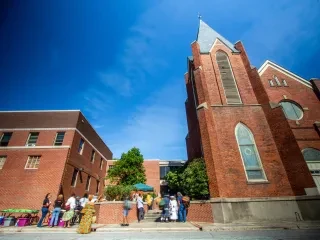
Durham
Black Wall Street gained national acclaim in the early 1900s when Black-owned businesses were the hub of activity on Parrish Street. Other places telling the story of Durham’s past:
- Whistle Stop Tours puts Black neighborhoods center stage on 75-minute walking tours with stops throughout the Hayti neighborhood and the former Black Wall Street district.
- The Pauli Murray Center for History and Social Justice, which is anchored by the childhood home of the activist and legal trailblazer, asks visitors to stand up for peace and equity. Black history, women’s history and LGBTQIA+ history are all explored here.
- The Hayti Heritage Center promotes the Black experience with poetry slams, writing and performance workshops, concerts, artist exhibitions and much more.
- At Carolina Theatre, walk through the exhibit on the second balcony level detailing the peaceful protests to desegregate the theater.
- RN Harris Elementary School, named after Rencher Nicholas Harris, the first Black person elected to Durham City Council and first Black person appointed to the Durham School Board.
- Support Black-owned businesses: Taste your way through James Beard Award-winning Chef Ricky Moore’s constantly changing menu at Saltbox Seafood Joint; order a coffee and French toast at Beyu Caffe, or go for vegan sweets at Bklyn Bakery; Shop for candles at Bright Black and for books at Rofhiwa Book Cafe.
More NC Civil Rights Trail Sites
Birthplaces and Primary Residences
- Ocean City Beach Community, North Topsail Beach
Churches and Spaces for Organization
- East Tarboro Citizens League, Tarboro
- Halifax Voters Movement, Enfield
- Hargraves Community Center, Chapel Hill
- New Ahoskie Baptist Church, Ahoskie
- Slades Chapel, Morganton
- Warren County Community Center, Warrenton
Educational Institutions
- Brevard High School, Brevard
- James H. Jones, Jackson
Legal & Courthouses
- Griggs v. Duke Power, Reidsville
- Johnson v. Branch, Enfield
Protests, Rallies & Sitins
- Adkin High School Walkout, Kinston
- Elizabeth City Sit-Ins, Elizabeth City
- Kinston Sit-Ins, Kinston
- Monroe Swim-Ins, Monroe
- Watts Grill, Chapel Hill
Visits by Civil Rights Icons
- Rev. Dr. Martin Luther King Jr. at Montreat, Montreat
Keep an eye out for more NC Civil Rights Trail markers to be added in coming months.



